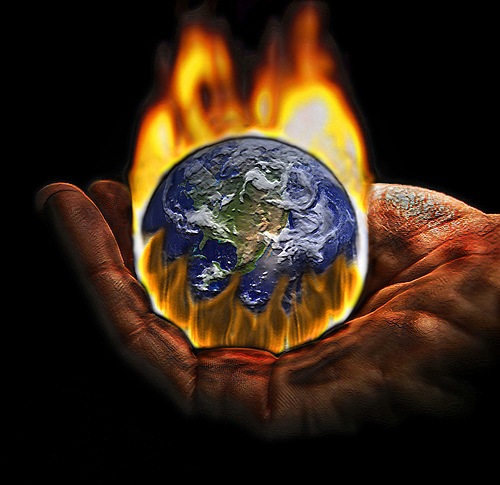In 1997, world leaders met in Kyoto, Japan to discuss how to confront, combat, and adapt to climate change. Eighteen increasingly warmer (on average) years later, a new set of climate talks start in Paris (France, not Kentucky) today (30 November), and continue for 12 days.
Some U.S. politicians have already courageously declared that the U.S. will do nothing, no matter how compelling the evidence, how severe the problems, or what the rest of the world thinks. As we get a new round of public commentary during and after the Paris talks, two recent studies—one journalistic and one academic—are worth considering.
The academic study is an article recently published in the refereed scientific journal Climatic Change, by Syrdan Medimorec and Gordon Peacock, titled “The language of denial: text analysis reveals differences in language use between climate change proponents and skeptics.” The authors examined the text of the most recent Intergovernmental Panel on Climate Change report, by a large international group of climate science and climate impact experts, and a competing assessment produced by politically conservative climate change deniers and skeptics. Despite the title of the article, by the way, the IPCC is not composed entirely of climate change proponents—it simply happens that the overwhelming majority of scientists recognize climate change and the risks associated with it. In general, the denier camp (the so-called skeptics), while increasingly unable to deny the reality of climate change, generally charges the climate science community with overstating the risks. However, Medimorec and Peacock found that it is the IPCC, not their critics, who are demonstrably more scientifically conservative and politically circumspect. The abstract of their paper:
We used text analyzers to compare the language used in two recently published reports on the physical science of climate change: one authored by the Intergovernmental Panel on Climate Change (IPCC) and the other by the Nongovernmental International Panel on Climate Change (NIPCC; a group of prominent skeptics, typically with prior scientific training, organized by the Heartland Institute). Although both reports represent summaries of empirical research within the same scientific discipline, our language analyses revealed consistent and substantial differences between them. Most notably, the IPCC authors used more cautious (as opposed to certain) language than the NIPCC authors. This finding (among others) indicates that, contrary to that which is commonly claimed by skeptics, IPCC authors were actually more conservative in terms of language style than their NIPCC counterparts. The political controversy over climate change may cause proponents’ language to be conservative (for fear of being attacked) and opponents’ language to be aggressive (to more effectively attack). This has clear implications for the science communication of climate research.

As illustrated by graphics like this, supporters of action to reduce climate change can also be guilty of hyperbole. However, the scientific assessments are generally conservative and not exaggerated.
In the journalistic study, the Associated Press asked eight climate and biological scientists to assess what 12 U.S. presidential candidates said in interviews, debates and tweets about climate, grading them on a 0 to 100 scale. To minimize bias, the candidates’ comments were stripped of names and assigned random numbers, so the scientists would not know who made each statement they were grading. The participating scientists were also selected by scientific societies, not the AP.
If we assume a 10-point grading scale (90-100 = A, 80-89 = B, etc.), there were two A’s (Hilary Clinton, Martin O’Malley), one B (Bernie Sanders), one D (Jeb Bush), and eight F’s. Of the latter, Chris Christie led the way with a 54, while Donald Trump, Ben Carson, and Ted Cruz brought up the rear with grades of 15, 13, and 6, respectively. One scientist wrote of one unidentified test subject, who turned out to be Cruz: “This individual understands less about science (and climate change) than the average kindergartner. That sort of ignorance would be dangerous in a doorman, let alone a president.” The AP’s story is here.
I do not know enough about the individual candidates to judge their overall intellect and education, and I acknowledge that some may truly be dimwitted and uninformed. However, I cannot imagine that they all are, and can thus only hypothesize that they make statements that they know are false or misleading to please certain political and donor constituencies.
So, as you evaluate public statements coming out of, or about, the climate talks, I suggest you consider the sources! Meanwhile, consider that in the 18 years since the Kyoto meetings:
•The Greenland and West Antarctic ice sheets have lost 5 trillion metric tons of ice (Andrew Shepherd, University of Leeds).
•Earth set a record for its hottest year since record-keeping began in 1997—a record that was subsequently broken in 1998, 2005, 2010, and 2014, and is sure to be broken again once 2015 is done (U.S. National Oceanic & Atmospheric Administration).
•Glaciers have lost, on average, 12 meters of ice thickness (World Glacier Monitoring Service, Switzerland).
•Global carbon dioxide emissions have increased more than 50% (U.S. Department of Energy).
•Arctic sea ice coverage is on average more than 2 million km2 less at its summer low point (U.S. National Snow and Ice Data Center).
•The five deadliest heat waves in history have occurred (in order of number of deaths, Europe 2003, Russia 2010, India & Pakistan 2015, western Europe 2006, southern Asia, 1998) (Centre for Research on the Epidemiology of Disaster, Belgium).
